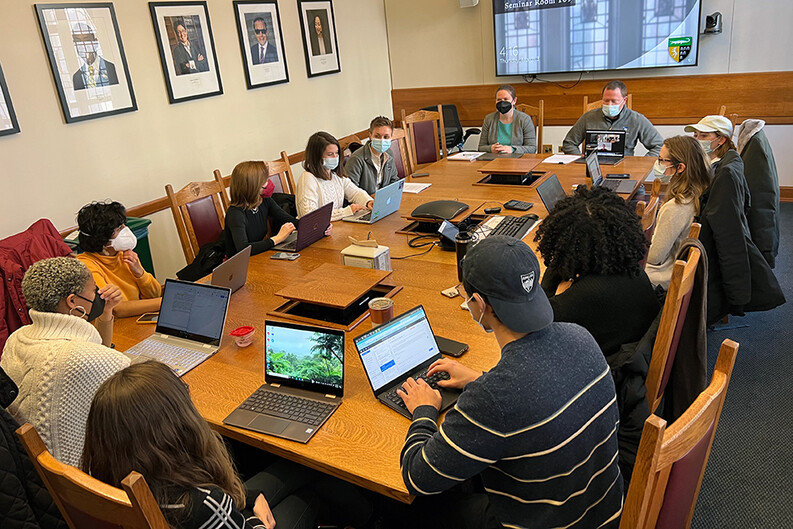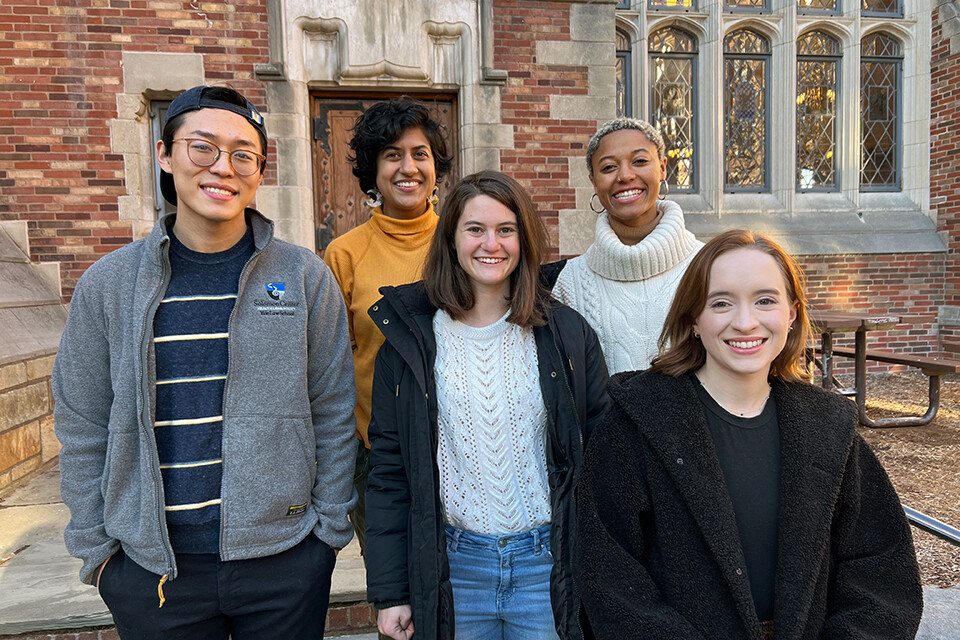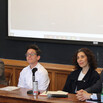Medical-Legal Partnerships Advocate for Equitable Care

When the pandemic exacerbated health justice issues for their clients, the Solomon Center for Health Law & Policy’s thriving network of Medical-Legal Partnerships didn’t slow down, they adapted. In 2021 alone, students in eight MLPs provided free legal services to more than 350 New Haven clients.
One of the most crucial goals in experiential learning is to teach students about the lawyer’s role in ensuring justice for historically marginalized populations. In Medical-Legal Partnerships (MLP), poverty-focused legal services are embedded in health care settings, so that lawyers can meet clients where they are, in places they trust, and aim to address their civil legal needs across the spectrum of issues. MLPs embrace the importance of social determinants of health: that a person’s well-being is determined not only by one’s medical care, but also by access to critical services like housing, nutrition, education, federal benefits, protection from discrimination, and more.
MLPs also champion the idea of health equity, an issue that has become even more critical in the midst of the COVID-19 pandemic, which shined a light on the severe inequities that plague our healthcare system.
“The MLPs become part of the care team to help address issues that affect health, but go beyond health and therefore cannot be addressed by medical providers alone,” said James Bhandary-Alexander, the inaugural Legal Director of the Medical-Legal Partnership Program at the Solomon Center, who joined the program in the summer of 2020, as part of a collaboration with Yale New Haven Hospital. “These social determinants of health are drivers for health inequity, and they are more apparent now than ever due to COVID-19.”
READ ABOUT THE HISTORY OF THE SOLOMON CENTER MLP PROGRAM
At Yale Law School, the Solomon Center is a powerful hub for student work at eight MLPs, supporting an incredible range of services, including palliative care, pediatric care, pediatric gender services, geriatric care, and oncology. The MLPs also assist veterans, people who were recently released from incarceration, and patients from the HAVEN Free Clinic in New Haven, providing support to particularly vulnerable populations in the city.
“However we can safely meet with patients and meet their needs, that’s what we’ll do.”
—Jacq Oesterblad ’22
Over the course of 10 years, the Solomon Center has built and expanded a strong network of MLPs through dynamic partnerships with institutions like Yale New Haven Hospital (YNHH), the Center for Children’s Advocacy, the Connecticut Veterans Legal Center, the SEICHE Center for Health and Justice, the Yale Child Study Center, the Yale Pediatric Gender Program, and the Yale School of Medicine to support this vital work. This thriving and growing network was relied upon immensely over the last two years as the pandemic exposed gaps in patient care and highlighted entrenched injustices in health care that affect marginalized populations.
“The veil has been lifted around social determinants of health,” said Katherine Kraschel, Executive Director of the Solomon Center. “MLPs have been the forefront of this issue for years now, and the broader health care system can no longer ignore it.”

Adapting to a New Normal
In 2021 alone, Yale Law School’s MLP students provided free legal services — from basic advice to full representation — to more than 350 New Haven clients. But the pandemic forced MLPs to be creative when working with clients in order to meet them where they are, according to Sarah Nathan ’23.
“We met with clients outside, at libraries, at community organizations, and even in our backyards,” said Nathan, who works with the HAVEN MLP as a student director, which in collaboration with the Yale School of Medicine, offers services to New Haven-area residents without insurance, many of whom are undocumented.
“Even in the best of times, the people we work with face barriers and abuses in many areas of their lives. COVID-19 made it that much harder for our patients to successfully advocate for their needs and access the resources that the government and organizations like HAVEN offer,” Nathan said.
Currently, 14 supervised law students work both in the MLP course and alongside health care teams, identifying and addressing social and legal issues that impact patient health. Twenty additional students volunteer at HAVEN. These partnerships create a one-stop care experience that offers direct legal aid and teaches patients about their rights while educating health care providers themselves about how to spot and structural problems that cause health inequities. A common refrain from providers is that it changes the way they practice — opening up their vision to a much broader array of issues to look for and try to address with their patients.
“The ethos of the MLPs at Yale Law School is unique,” said Bhandary-Alexander. “Each partnership is a special opportunity for students to develop not just their legal skills, but their social, small-p political, and organizational skills, drawing energy from their best moral and ethical impulses.”
Not only has the COVID-19 pandemic illustrated how inaccessible health justice can be for these communities, but it presented unique challenges for students working in MLPs around New Haven who learned how to adapt and navigate obstacles.
“The theme of the year has been adaptability and flexibility,” explained Jacq Oesterblad ’22, another member of the HAVEN MLP. “However we can safely meet with patients and meet their needs, that’s what we’ll do.”
MLP work is largely premised on lawyers being on-site during patient care, so working in a remote environment during the pandemic compelled partnerships to navigate novel territory, finding the best ways to provide legal services that are integrated with medical care in a safely and successfully in a virtual format.
Many solutions during the pandemic came through turning to technology. Students who typically performed intake at the hospital or clinic did the work remotely using iPads, phones, and computers, and program supervisors employed video chat to oversee students’ work.
“It was and is a working solution,” Bhandary-Alexander said. “Especially when students returned to campus, once they were in person together, they could better coordinate their services.”
“Instead of administering civil legal needs assessments with our clients in person, we spoke with our clients via phone and via Zoom,” said Ify Chikezie ’22. Chikezie worked with the Transitions MLP, which serves recently incarcerated individuals in partnership with Yale’s SEICHE Center for Health and Justice. “We also brought ourselves up to speed on COVID-19-related measures and programs that were relevant to our clients, like mutual aid networks and evictions moratoriums.”

Expanding Care
Building on the Solomon Center’s robust history, MLPs at the Law School have continued to expand to respond to ever-increasing needs in the community. In 2022, new partnerships at YNHH’s oncology and geriatric departments have launched to reach even more clients.
In 2019, Kraschel and attorney Day Pitney LLP partner Rebecca Iannantuoni, approached Dr. James Lai, Associate Chief for Clinical Affairs at the Yale School of Medicine, who oversees the School’s Section of Geriatrics, to consider a partnership with the Law School to serve older patients.
“We recognized the challenges of connecting legal services to older adults,” Lai said. “Specifically, the physical and technological challenges of reaching homebound patients and disconnected families.”
Those early conversations took place alongside increasing requests coming to the Solomon Center about elder justice. Together, this greater interest inspired the work of the new Adrienne C. Drell and Franklin W. Nitikman Elder Law Project at the Solomon Center, which launched in 2020 with the support of Adrienne Drell ’92 MSL and Franklin Nitikman ’66 LLB. The Project supports among other things the new geriatric MLP, which is one of only a few of its kind in the country. Referrals to the partnership are facilitated by the palliative care and geriatric teams at YNHH, which include Iannantuoni and other elder justice policy advocates Gena Lennon-Gomez, the Yale Geriatrics Consult Service, the Yale/NEMG Home-Based Primary Care Program, and the Adler Geriatric Assessment Center.
According to Lai, the pandemic has highlighted the importance of clear goals of care and advanced planning for elderly patients.
“Early referral to MLP has uncovered key missed steps in a complex process where patients often do not recognize the value of legal guidance,” he said.
For Yale Law School students, the new MLP has provided an opportunity to advocate for some of the most vulnerable members of the community, according to Geriatric MLP student director Derek Mubiru ’23.
“Working with the Geriatric MLP has been one of my most meaningful experiences in law school,” Mubiru said. “The impact and importance of our work has really come to the forefront during COVID-19. While virtual lawyering presents unique challenges and limitations, it has also allowed us to cast a wider net by making access to our services more convenient for many patients.”
The Geriatric MLP is not the only one expanding its reach. While the Solomon Center has run a palliative care MLP since 2016, in collaboration with YNHH and Smilow Cancer Center, the Solomon Center launched an Oncology MLP in 2021 with support from Eli Lily, led by Emily Rock ’14, the Solomon Center’s first MLP fellow.
Working with its first cohort of law students, the partnership began taking referrals for breast cancer patients last fall for legal issues including employment, public benefits, immigration, and housing.
Because referrals began during the pandemic and oncology patients are immunocompromised, the Oncology MLP works with patients primarily by phone and video conference.
“Being able to assist them without increasing their exposure to COVID-19 has been crucial,” Rock said. “We can address upstream legal issues before they become a crisis.”
Looking to the Future
The Solomon Center’s growing medical-legal partnerships are a testament to the effectiveness of these partnerships in patient care, according to proponents. Evidence backs this up: studies cited in a 2021 paper to which Bhandary-Alexander contributed showed that when legal services and expertise are used to address social needs, people report lower levels of stress and are admitted to the hospital less often. Even more, MLPs control medical costs over time and improve outcomes by finding the root cause of a medical issue and resolving it.
“MLPs have transformed the way doctors think of lawyers...and have dramatically broadened the field’s understanding of the critical importance of social determinants of health for health outcomes and equity.”
—Professor Abbe R. Gluck ’00
“MLPs have transformed the way doctors think of lawyers — as partners not as obstacles — and have dramatically broadened the field’s understanding of the critical importance of social determinants of health for health outcomes and equity,” explained Alfred M. Rankin Professor of Law Abbe R. Gluck ’00, faculty director of the Solomon Center. “When we launched this program a decade ago, advancing equity in our community here in New Haven was at the forefront of our minds; it is enormously meaningful to see the scholarship, careers, and real-world impacts that have come from this effort and to be part of the emerging national conversation about the value of MLP.”
And now, lawmakers are paying attention.
“Federal health care funding for MLPs has been limited to Federally Qualified Health Centers as an ‘enabling service’ they can include as part of their federal grants — it’s a very specific type of funding,” Kraschel said.
Bhandary-Alexander, Rock, and others are lobbying at the state and national level for funding for current and future MLPs and the healthcare infrastructure to support them.
Last fall, Rock and Bhandary-Alexander urged Congress to act in support of funding elder care MLPs. And in February, Bhandary-Alexander and a coalition of advocates and labor unions called on Connecticut policymakers to make investments to fully staff the mental health system.
With health justice, equity, and public health top of mind, the Solomon Center and its partners continue toward a more integrated approach to health care while championing the MLP model. At YLS through the Solomon Center, the MLP program gives students a platform to take a leadership role in developing MLP practice, theory, and organizations. This training has also created careers in the field, as more than a dozen former students have gone on to work on MLPs after graduation, leading to important impact in communities around the country.
“We are lucky at YLS to have an incredibly bright and engaged group of law students, who not only put their hearts into the work, but also bring in innovative ideas,” Rock said. “As a YLS alum whose favorite law school experiences were in clinic, I am grateful to now be in the position to advise and supervise students in getting real-world legal experience and helping folks in our New Haven community.”
The Solomon Center plans to hold a major conference in the Spring of 2023 to bring together MLP leaders across the country to talk about their work, impact, common challenges and the incredible promise they offer to the future of health care. Visit the Solomon Center website for more information on the MLP program.


